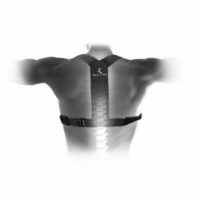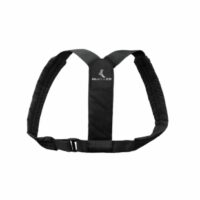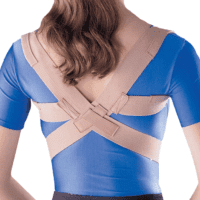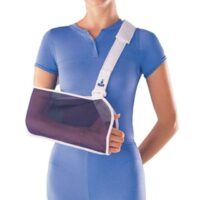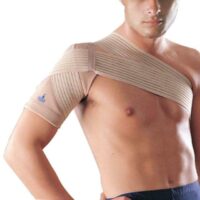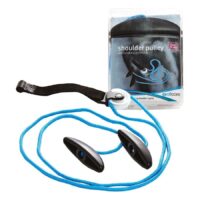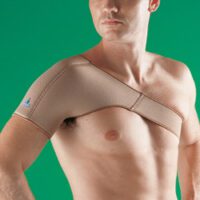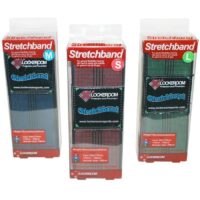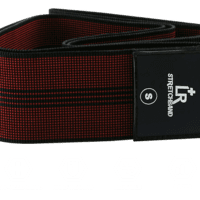Broken Shoulder (Fractured Humerus)
Article by John Miller

Broken Shoulder
Understanding Shoulder Fractures
When a bone near the shoulder joint breaks, we call it a shoulder fracture or a broken shoulder. Often, this involves the humerus, the upper arm bone connecting the shoulder to the elbow. It can break in many places, including its neck. Knowing where the fracture is helps doctors decide on the best treatment, especially as key shoulder muscles connect to this bone.
Fractures in the shoulder often result from falls. Sometimes, another fracture might occur in the shoulder at the same time.
Fracture or Break: Which is More Severe?
A fracture and a break mean the same thing, no matter what others might tell you. “Fracture” is just the medical term for “broken bone”. You’ll find different types of fractures like greenstick (incomplete), transverse (across the bone), and spiral (around the bone), among others.
Always let an orthopaedic surgeon check out any shoulder fractures.
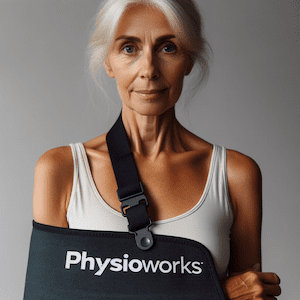
Treatment for a Broken Shoulder
If an X-ray confirms a broken shoulder, doctors usually support it with a collar and cuff sling. This sling, holding your arm at the wrist, uses your elbow’s weight to help the broken bones heal correctly.
Avoid putting anything under your elbow as it can push the humerus up and misalign the bones. That’s why triangular slings don’t work well. When resting, don’t use a pillow to support your arm.
Wear the collar and cuff for around six weeks, even over your clothes. You can take it off to wash. The first two weeks might be painful, so consult your doctor about pain management.
In some situations, a surgeon might recommend surgery to fix the broken shoulder.
Physiotherapy & Exercises for Healing
If you don’t need surgery, wear the collar and cuff as instructed by your shoulder specialist. While doing so, keep moving your fingers and wrist to avoid stiffness. Your doctor or physiotherapist will guide you on when to start various exercises. Remember, don’t rush things; you don’t want to worsen your shoulder fracture.
Movement helps prevent stiffness, but healing your fractured humerus remains the main goal. Always listen to health experts to recover full movement quickly.
For the best exercises and timings, rely on your physiotherapist. If your shoulder feels stiffer, seek their advice within two weeks of the injury or surgery for optimal results.
Will Recovery be Complete?
Most likely, yes! Expect improvements in your broken shoulder for up to a year, with significant progress early on.
Helpful Tips for a Broken Shoulder
- Washing: Remove the collar and cuff and swing your arm gently to wash underneath.
- Driving: Don’t drive while wearing a collar and cuff. Wait at least eight weeks after removing the sling before driving again.
- Work: Depending on your job, you might return within two weeks. If you have a hands-on job, wait at least three months.
- Sport: Engage in light, non-contact sports after six weeks, but reduce your playtime.
- Smoking: Avoid it. Smoking can delay bone healing.
Potential Complications
Sometimes, a broken shoulder doesn’t heal right, and you might need corrective surgery. If the fracture heals wrongly, surgery can correct it or even put in an artificial joint.
General Advice
After a shoulder fracture, you might see significant bruising down your arm, which can linger for days. This injury is common, especially in older folks, and the shoulder might feel stiffer than before.
For any concerns, always reach out to your physiotherapist or doctor.
In Summary
A broken shoulder or fractured humerus can be a challenging experience for anyone. Whether caused by a fall or another form of trauma, understanding the nature of the injury and the available treatments is crucial. With proper care, support from medical professionals, and physiotherapy, most people make a full recovery.
It’s essential to follow the advice given, avoid certain activities during the healing process, and remain patient. As always, if concerns arise or if symptoms worsen, seeking guidance from your physiotherapist or doctor is paramount. Remember, taking care of your shoulder now ensures better mobility and health in the future.
Rochedale - Call 38410277
Book Online: RochedaleSalisbury - Call 32751044
Book Online: SalisburySandgate - Call 32691122
Book Online: SandgateRelated Articles
- Post-Fracture Physiotherapy: Focuses on rehabilitation services to promote healing and regain strength following fractures, directly applicable to a broken shoulder.
- Shoulder Pain: This article covers various causes of shoulder pain, including muscle tightness, weakness, or abnormal contraction patterns, offering insights into identifying and managing these causes.
- Rotator Cuff Injury: Explores symptoms like pain extending to the elbow and discomfort when lying on the affected shoulder, providing guidance on identifying and managing rotator cuff injuries.
- Physiotherapy for Shoulder Pain: Discusses the role of physiotherapy in alleviating discomfort, improving mobility, and optimising shoulder health, making it a valuable resource for those experiencing shoulder pain.
- Rotator Cuff Tear: Addresses the causes, symptoms, and treatment of rotator cuff tears, which can occur from sudden trauma or repeated microtrauma, providing essential information for those affected by this injury.
- Rotator Cuff Exercises: Highlights the importance of strengthening the rotator cuff for shoulder health and stability, offering exercise recommendations specifically for the rotator cuff.
- Shoulder Impingement: Discusses symptoms of shoulder impingement and effective treatment strategies, focusing on how to manage this condition and prevent its worsening over time.
- Rotator Cuff Tendinopathy: Offers insights into this condition, which affects the tendons in the shoulder, leading to pain and limited mobility, and discusses various injuries to the rotator cuff tendons.
- Sports Injury Physiotherapy: Provides immediate care for sports-related injuries, which could include shoulder fractures, focusing on quick recovery and preventing further damage.
- Musculoskeletal Physiotherapy: Discusses comprehensive assessment and treatment for conditions like strains, sprains, and overuse injuries, relevant to shoulder fracture cases.



